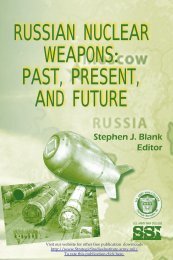The United States and China in Power Transition - Strategic Studies ...
The United States and China in Power Transition - Strategic Studies ...
The United States and China in Power Transition - Strategic Studies ...
You also want an ePaper? Increase the reach of your titles
YUMPU automatically turns print PDFs into web optimized ePapers that Google loves.
<strong>United</strong> <strong>States</strong> st<strong>and</strong>s for the democratic pr<strong>in</strong>ciples. It<br />
does not matter if other democracies are parliamentary<br />
or presidential. Germany <strong>and</strong> Japan are perfect<br />
examples. After their defeat <strong>in</strong> World War II, both nations<br />
were under U.S. occupation. <strong>The</strong> <strong>United</strong> <strong>States</strong><br />
could dictate how they rebuilt their countries, but the<br />
<strong>United</strong> <strong>States</strong> <strong>in</strong>stead left them to make the one that<br />
fit their national needs. <strong>The</strong> recent example of Iraq is<br />
another. Aga<strong>in</strong>, the <strong>United</strong> <strong>States</strong> did not require Iraq<br />
to be rebuilt like the <strong>United</strong> <strong>States</strong>.<br />
<strong>Ch<strong>in</strong>a</strong>’s democratic change will not remove its<br />
conflicts of <strong>in</strong>terests with the <strong>United</strong> <strong>States</strong>, but it will<br />
make those conflicts less contentious. While under the<br />
<strong>in</strong>fluence of ideological difference, every conflict automatically<br />
becomes a test of will. It is a life <strong>and</strong> death<br />
situation. With the removal of ideological difference,<br />
<strong>Ch<strong>in</strong>a</strong> may not become a “dear friend,” but it will not<br />
be a condemned enemy. Russia is an example.<br />
FLASHPOINTS IN THE U.S.-CHINA RELATIONS<br />
Although <strong>Ch<strong>in</strong>a</strong> <strong>and</strong> the <strong>United</strong> <strong>States</strong> underst<strong>and</strong><br />
that the two are engaged <strong>in</strong> a power transition process;<br />
the two nations need to take careful measures<br />
to manage this contentious relationship; as U.S. Secretary<br />
of State Cl<strong>in</strong>ton put it loudly <strong>in</strong> her 6th visit to<br />
Asia s<strong>in</strong>ce tak<strong>in</strong>g office, “it is not <strong>in</strong> anyone’s <strong>in</strong>terest<br />
for the <strong>United</strong> <strong>States</strong> <strong>and</strong> <strong>Ch<strong>in</strong>a</strong> to see each other as<br />
adversaries, [so] we are work<strong>in</strong>g together to chart a<br />
positive, cooperative, <strong>and</strong> comprehensive relationship<br />
for this new century;” 51 logically there is no reason for<br />
<strong>Ch<strong>in</strong>a</strong> to <strong>in</strong>itiate a fight over this change, <strong>and</strong> <strong>Ch<strong>in</strong>a</strong>’s<br />
peaceful evolution will eventually help make the U.S.-<br />
<strong>Ch<strong>in</strong>a</strong> relations more manageable. <strong>The</strong> two nations<br />
nonetheless have contentions over what can be called<br />
<strong>Ch<strong>in</strong>a</strong>’s “nation-build<strong>in</strong>g” issues.<br />
97

















